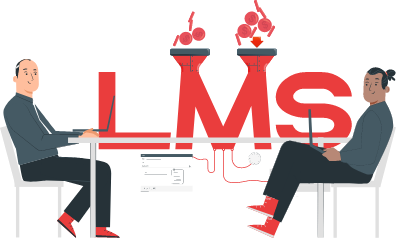Learning Management System
Simplify your course content management, learning, and trainings with Learning Management Software
Learning Management Software is a flexible tool, provides flexibility to manage every aspect of learning within your organization. The LMS software makes life easier for training & development of learners to identify and assess learning goals, track progress to meet the goals and collect data to supervise the whole learning process.
How does LMS software work?
A cloud-based Learning Management System directly impacts the learning process of your organization
In today’s fast-paced and demanding world, organizations confront numerous learning challenges, as the pandemic has shown. The duty of the Learning Management System is beyond managing training and planning of courses. It covers a learning path, tracking the learner’s progress and offering personalized content to the learners. With a user-friendly interface, LMS creates a distraction-free context and makes learning a breeze. Learners can navigate through the platform easily and access information in a snap.
An Enterprise learning management serves for the admin user and delivery of training to employees to establish professional knowledge and skills. The system is also used for educating non-technical users, i.e., consumers and stakeholders, of an enterprise’s products and services.
Organizations use LMS software to deliver training online, learners from anywhere in the world can connect with instructors in real-time. This system helps in enhancing employee skills and expertise and improves the learner retention rate for an enterprise.
The Learning Management System for schools supports teachers to change the traditional system into new and advanced methods. It also helps keep checks on student progress throughout the class.
Learning Management System features
Gain better control of the learning process with the LMS software
-
Course Authoring
Organize different learning sources like text, pdf, images, videos, tables, links , interactive tests, and slideshows etc. It also authorizes instructors to track learning progress.
-
Course Management
This important feature of LMS eLearning provides course materials and instructional channels details. It allows you to safely access & maintain professionally structured course contents.
-
Evaluations & Assessments
This feature enables instructors to create online assessments and assignments for learners, to examine knowledge retention and evaluate their performance on the basis of tests.
-
Analytics & Reporting
One of the most important features of our LMS includes the ability to track reports and measure the impact of learning programs on your business.
-
Learners Management
Learner Management System enables you to manage and record every information about your learners, from enrolling new learners to resetting their progress to test scores.
-
Learner Interaction
Learners can connect with the course content in multiple ways via multimedia, assignments, self-assessments. They can interact with each other via discussion forums & presentations.
-
Visual Learning
An LMS is also suited for individual trainees, especially when it comes to facilitating remote learning to attend training sessions with the help of webcams.
Benefits of LMS Software
Learning management system software offers a complete availability of courses tailored to your organization
Organizing Learning Materials
By using a centralized database, you create a single source of the learning and training material. It’s well-organized system lets you manage the employee training process.
Better Progress Tracking
LMS helps in managing track of records in compliance with industry requirements. Also, tracking is simple with LMS as the single place to monitor progress reports.

Reduced Costs
By unifying all your learning management processes to the Learning Management System, it significantly reduces the administrative cost of delivering learning aids across the organization.
Ensures compliance
Ensures the integration of latest policies and regulations into courses. It helps employees to better understand the code of conduct and apply them to specific situations.